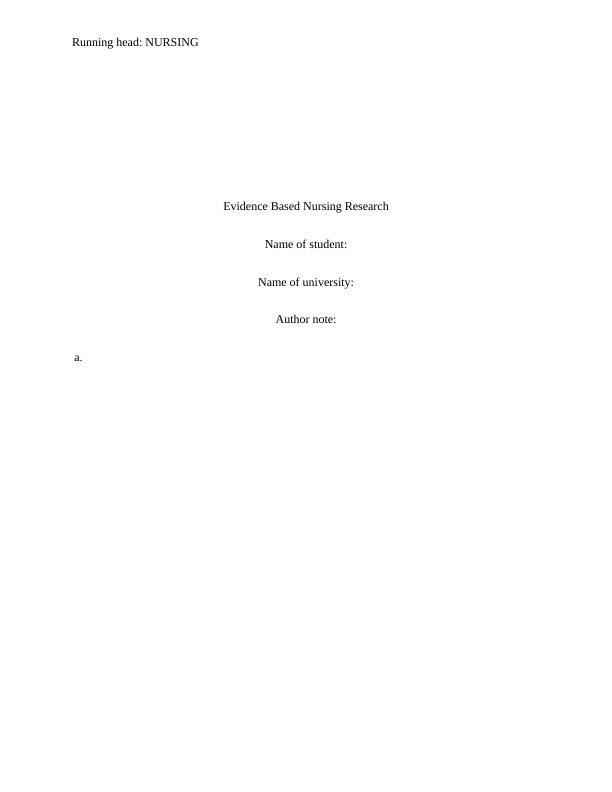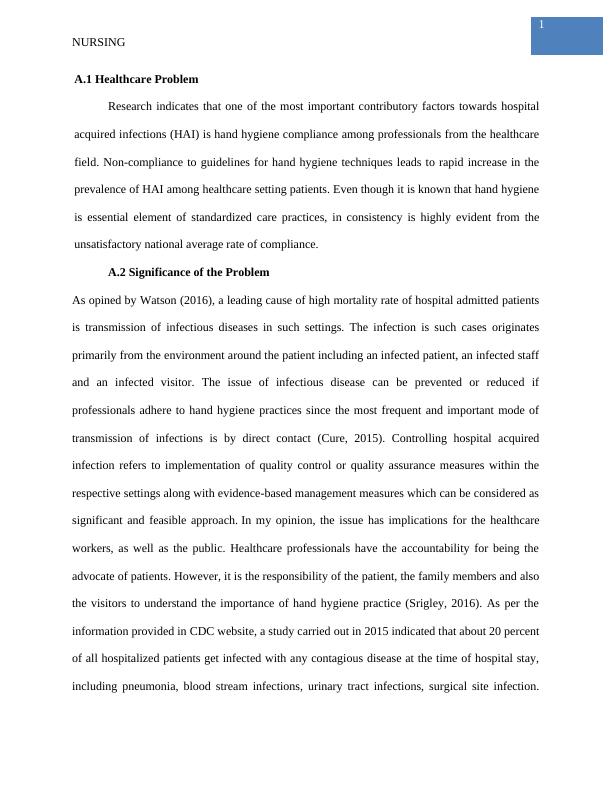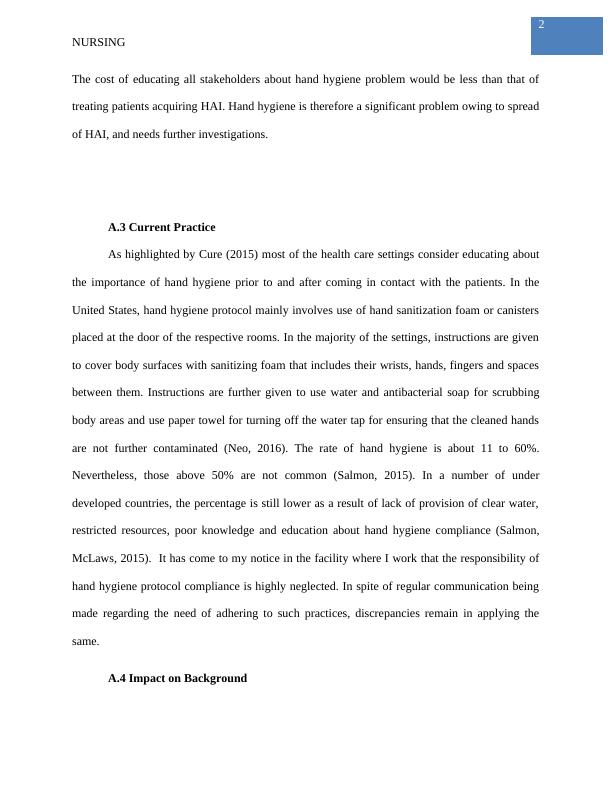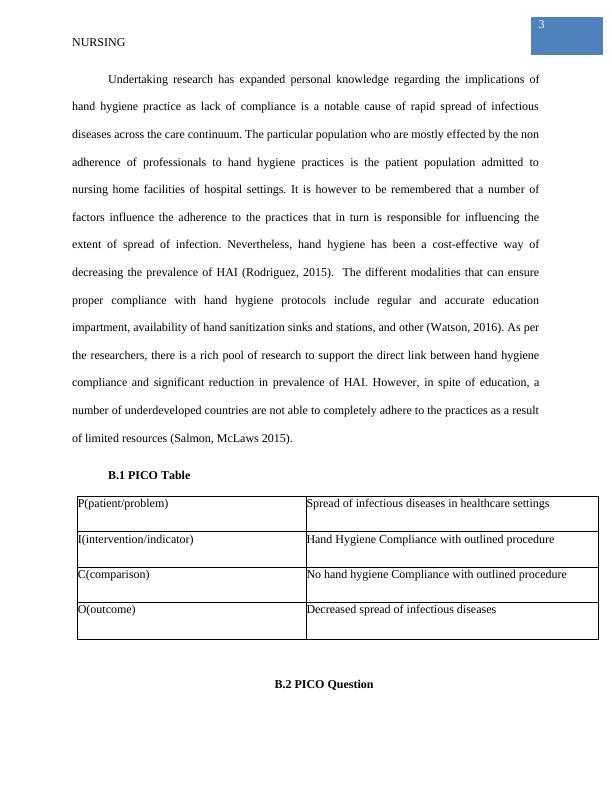Evidence Based Nursing Research on Hand Hygiene Compliance and Hospital Acquired Infections
Added on 2023-06-10
12 Pages3453 Words324 Views
Running head: NURSING
Evidence Based Nursing Research
Name of student:
Name of university:
Author note:
a.
Evidence Based Nursing Research
Name of student:
Name of university:
Author note:
a.

1
NURSING
A.1 Healthcare Problem
Research indicates that one of the most important contributory factors towards hospital
acquired infections (HAI) is hand hygiene compliance among professionals from the healthcare
field. Non-compliance to guidelines for hand hygiene techniques leads to rapid increase in the
prevalence of HAI among healthcare setting patients. Even though it is known that hand hygiene
is essential element of standardized care practices, in consistency is highly evident from the
unsatisfactory national average rate of compliance.
A.2 Significance of the Problem
As opined by Watson (2016), a leading cause of high mortality rate of hospital admitted patients
is transmission of infectious diseases in such settings. The infection is such cases originates
primarily from the environment around the patient including an infected patient, an infected staff
and an infected visitor. The issue of infectious disease can be prevented or reduced if
professionals adhere to hand hygiene practices since the most frequent and important mode of
transmission of infections is by direct contact (Cure, 2015). Controlling hospital acquired
infection refers to implementation of quality control or quality assurance measures within the
respective settings along with evidence-based management measures which can be considered as
significant and feasible approach. In my opinion, the issue has implications for the healthcare
workers, as well as the public. Healthcare professionals have the accountability for being the
advocate of patients. However, it is the responsibility of the patient, the family members and also
the visitors to understand the importance of hand hygiene practice (Srigley, 2016). As per the
information provided in CDC website, a study carried out in 2015 indicated that about 20 percent
of all hospitalized patients get infected with any contagious disease at the time of hospital stay,
including pneumonia, blood stream infections, urinary tract infections, surgical site infection.
NURSING
A.1 Healthcare Problem
Research indicates that one of the most important contributory factors towards hospital
acquired infections (HAI) is hand hygiene compliance among professionals from the healthcare
field. Non-compliance to guidelines for hand hygiene techniques leads to rapid increase in the
prevalence of HAI among healthcare setting patients. Even though it is known that hand hygiene
is essential element of standardized care practices, in consistency is highly evident from the
unsatisfactory national average rate of compliance.
A.2 Significance of the Problem
As opined by Watson (2016), a leading cause of high mortality rate of hospital admitted patients
is transmission of infectious diseases in such settings. The infection is such cases originates
primarily from the environment around the patient including an infected patient, an infected staff
and an infected visitor. The issue of infectious disease can be prevented or reduced if
professionals adhere to hand hygiene practices since the most frequent and important mode of
transmission of infections is by direct contact (Cure, 2015). Controlling hospital acquired
infection refers to implementation of quality control or quality assurance measures within the
respective settings along with evidence-based management measures which can be considered as
significant and feasible approach. In my opinion, the issue has implications for the healthcare
workers, as well as the public. Healthcare professionals have the accountability for being the
advocate of patients. However, it is the responsibility of the patient, the family members and also
the visitors to understand the importance of hand hygiene practice (Srigley, 2016). As per the
information provided in CDC website, a study carried out in 2015 indicated that about 20 percent
of all hospitalized patients get infected with any contagious disease at the time of hospital stay,
including pneumonia, blood stream infections, urinary tract infections, surgical site infection.

2
NURSING
The cost of educating all stakeholders about hand hygiene problem would be less than that of
treating patients acquiring HAI. Hand hygiene is therefore a significant problem owing to spread
of HAI, and needs further investigations.
A.3 Current Practice
As highlighted by Cure (2015) most of the health care settings consider educating about
the importance of hand hygiene prior to and after coming in contact with the patients. In the
United States, hand hygiene protocol mainly involves use of hand sanitization foam or canisters
placed at the door of the respective rooms. In the majority of the settings, instructions are given
to cover body surfaces with sanitizing foam that includes their wrists, hands, fingers and spaces
between them. Instructions are further given to use water and antibacterial soap for scrubbing
body areas and use paper towel for turning off the water tap for ensuring that the cleaned hands
are not further contaminated (Neo, 2016). The rate of hand hygiene is about 11 to 60%.
Nevertheless, those above 50% are not common (Salmon, 2015). In a number of under
developed countries, the percentage is still lower as a result of lack of provision of clear water,
restricted resources, poor knowledge and education about hand hygiene compliance (Salmon,
McLaws, 2015). It has come to my notice in the facility where I work that the responsibility of
hand hygiene protocol compliance is highly neglected. In spite of regular communication being
made regarding the need of adhering to such practices, discrepancies remain in applying the
same.
A.4 Impact on Background
NURSING
The cost of educating all stakeholders about hand hygiene problem would be less than that of
treating patients acquiring HAI. Hand hygiene is therefore a significant problem owing to spread
of HAI, and needs further investigations.
A.3 Current Practice
As highlighted by Cure (2015) most of the health care settings consider educating about
the importance of hand hygiene prior to and after coming in contact with the patients. In the
United States, hand hygiene protocol mainly involves use of hand sanitization foam or canisters
placed at the door of the respective rooms. In the majority of the settings, instructions are given
to cover body surfaces with sanitizing foam that includes their wrists, hands, fingers and spaces
between them. Instructions are further given to use water and antibacterial soap for scrubbing
body areas and use paper towel for turning off the water tap for ensuring that the cleaned hands
are not further contaminated (Neo, 2016). The rate of hand hygiene is about 11 to 60%.
Nevertheless, those above 50% are not common (Salmon, 2015). In a number of under
developed countries, the percentage is still lower as a result of lack of provision of clear water,
restricted resources, poor knowledge and education about hand hygiene compliance (Salmon,
McLaws, 2015). It has come to my notice in the facility where I work that the responsibility of
hand hygiene protocol compliance is highly neglected. In spite of regular communication being
made regarding the need of adhering to such practices, discrepancies remain in applying the
same.
A.4 Impact on Background

3
NURSING
Undertaking research has expanded personal knowledge regarding the implications of
hand hygiene practice as lack of compliance is a notable cause of rapid spread of infectious
diseases across the care continuum. The particular population who are mostly effected by the non
adherence of professionals to hand hygiene practices is the patient population admitted to
nursing home facilities of hospital settings. It is however to be remembered that a number of
factors influence the adherence to the practices that in turn is responsible for influencing the
extent of spread of infection. Nevertheless, hand hygiene has been a cost-effective way of
decreasing the prevalence of HAI (Rodriguez, 2015). The different modalities that can ensure
proper compliance with hand hygiene protocols include regular and accurate education
impartment, availability of hand sanitization sinks and stations, and other (Watson, 2016). As per
the researchers, there is a rich pool of research to support the direct link between hand hygiene
compliance and significant reduction in prevalence of HAI. However, in spite of education, a
number of underdeveloped countries are not able to completely adhere to the practices as a result
of limited resources (Salmon, McLaws 2015).
B.1 PICO Table
P(patient/problem) Spread of infectious diseases in healthcare settings
I(intervention/indicator) Hand Hygiene Compliance with outlined procedure
C(comparison) No hand hygiene Compliance with outlined procedure
O(outcome) Decreased spread of infectious diseases
B.2 PICO Question
NURSING
Undertaking research has expanded personal knowledge regarding the implications of
hand hygiene practice as lack of compliance is a notable cause of rapid spread of infectious
diseases across the care continuum. The particular population who are mostly effected by the non
adherence of professionals to hand hygiene practices is the patient population admitted to
nursing home facilities of hospital settings. It is however to be remembered that a number of
factors influence the adherence to the practices that in turn is responsible for influencing the
extent of spread of infection. Nevertheless, hand hygiene has been a cost-effective way of
decreasing the prevalence of HAI (Rodriguez, 2015). The different modalities that can ensure
proper compliance with hand hygiene protocols include regular and accurate education
impartment, availability of hand sanitization sinks and stations, and other (Watson, 2016). As per
the researchers, there is a rich pool of research to support the direct link between hand hygiene
compliance and significant reduction in prevalence of HAI. However, in spite of education, a
number of underdeveloped countries are not able to completely adhere to the practices as a result
of limited resources (Salmon, McLaws 2015).
B.1 PICO Table
P(patient/problem) Spread of infectious diseases in healthcare settings
I(intervention/indicator) Hand Hygiene Compliance with outlined procedure
C(comparison) No hand hygiene Compliance with outlined procedure
O(outcome) Decreased spread of infectious diseases
B.2 PICO Question

End of preview
Want to access all the pages? Upload your documents or become a member.
Related Documents
Hospital Acquired Infection and Nursing Interventionslg...
|3
|2138
|205
Educating Nursing Professionals about the Importance of Hospital Acquired Infections (HAIs)lg...
|4
|743
|433
Hand Washing under Acute Care Settings | Reportlg...
|13
|2986
|17
Assignment on Evidence Based Practice Projectlg...
|17
|3425
|14
Legal and Professional Issues in Nursinglg...
|5
|825
|65
Training and Education of Hand Hygiene among Nursing Professionals to Reduce Hospital Acquired Infectionlg...
|12
|3083
|158
